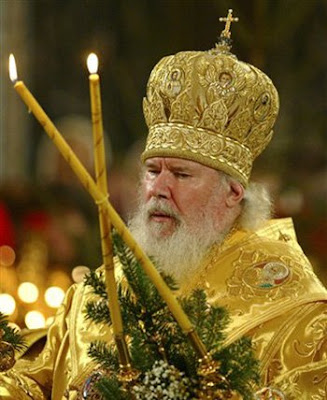
MOSCOW (AFP) — Russian Orthodox Church patriach Alexy II -- a conservative who oversaw a post-Soviet renaissance of the Russian Church, yet was steadily criticised as subservient to the Kremlin -- died on Friday. He was aged 79.
Alexy, 79, died at his secluded residence outside Moscow. No cause of death was announced officially, but state news agency RIA Novosti, quoting church sources it did not name, said he had died of a heart attack.
An emergency church synod was to convene in Moscow on Saturday to make arrangements for a funeral, which is expected next week but whose date has yet to be announced, and begin deliberations on a successor.
Under church tradition, the synod has up to six months to select a new patriarch.
Russian politicians including President Dmitry Medvedev and Prime Minister Vladimir Putin quickly offered their condolences.
"A great sorrow has befallen our country, our society," Medvedev said in a statement, calling Alexy II "a great citizen of Russia."
A spokeswoman said Medvedev was postponing a planned visit to Italy this weekend and would return directly to Moscow.
Putin called the death "a great loss" and added that "he did very much for the establishment of a new Russian statehood."
In Vatican City, Pope Benedict XVI said he was "profoundly saddened" and expressed grief on behalf of the Roman Catholic Church, whose relations with Russian Orthodoxy have long been wary.
"I am pleased to recall the efforts of the late Patriarch for the rebirth of the Church," he said in a message to the Holy Synod of the Russian Orthodox Church, citing the "severe ideological oppression" of the Soviet era.
Despite leading the church during a period of robust revival, Alexy II was regarded by many as essentially an establishment figure and was criticised by some as being too ready to serve the Kremlin's political causes.
Born Alexei Ridiger, he made his ecclesiastical career at a time when the church was controlled by Soviet authorities before forging an alliance with the new Russian state under presidents Boris Yeltsin and Vladimir Putin.
The patriarch was an impressive character with a benign expression and moral authority among millions of Russian believers but his personality was always locked in by the deeply hierarchical nature of his role.
Alexy II took stances on foreign policy issues that often matched the Kremlin line, criticising NATO strikes against Yugoslavia, the US-led war in Iraq and defending the rights of ethnic-Russians in the former Soviet Union.
But his role in the international arena was marked above all by wariness of Roman Catholics, whom he accused of "proselytism," and he refused repeatedly to meet Pope John Paul II and his successor Benedict XVI.
He was also, however, a unifying Orthodox figure who helped engineer a union with a branch of the Russian Orthodox church that separated from Moscow-based church authorities after the 1917 Soviet revolution.
Ridiger was born on February 23, 1929 in then independent Estonia, the son of an Orthodox priest. He worked in two cathedrals after Estonia became part of the Soviet Union and entered a religious seminary under Stalin.
He married but then divorced in order to become a monk in 1961 during the anti-religion campaigns launched by Soviet leader Nikita Khrushchev. He was soon promoted to bishop.
Ridiger had a successful career under Leonid Brezhnev at a time when the Orthodox church was effectively controlled by the KGB and dissident priests were thrown into jail.
Despite his ties with the Communist establishment, he made some efforts to curb Soviet repression, including keeping open a famous convent in Estonia that was threatened with closure.
He became patriarch in 1990, shortly before the fall of the Soviet Union.
At the time, Alexy was seen as more in touch with the reforms to the Soviet system being undertaken by Mikhail Gorbachev than another candidate, metropolitan Filaret, considered even closer to the Communist regime.
The new patriarch remained prudent after the fall of the Communist system, ruling out investigations against church officials accused of links to the Soviet secret services.
In close collaboration with Yeltsin and Putin, Alexy II used his close relations with the authorities to rebuild the influence of the Orthodox church.
Seminaries were restored, churches rebuilt and church finances greatly boosted by income from customs duties granted by the Russian government during the 1990s.
The lavish Christ the Saviour cathedral in central Moscow, which was destroyed under Stalin and replaced by an open-air swimming pool, was rebuilt in full splendour during Alexy II's patriarchate.















No comments:
Post a Comment